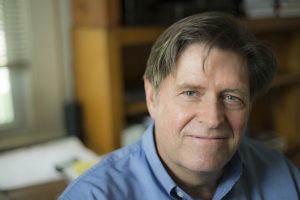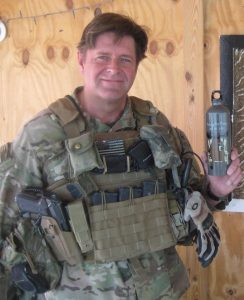Three years can invoke a lot of change. Just ask University of Lynchburg criminology instructor Keith Smith. When he joined the U.S. Marines on September 1, 1972, he expected to be sent to Vietnam. Instead, he joined the White House staff during a notorious time in politics: the Watergate scandal.
Smith worked at the White House while Richard Nixon was president and saw the whole scandal unfold. Since he was on the staff, he was exposed to the U.S. court hearings and worked security at Camp David. At this private presidential resort, agents from other intelligence services tried to spy on Nixon. Smith became occupied with chasing these federal agents off to give privacy to the president.

In these three years, not only did America change with the resignation of one president and the start of a new president, but Smith learned more about himself.
While in the military, Smith said he had a lack of control over his situations. There was little individualism, and while reflecting on his time in the Marines he realized that he wanted to have control over his actions. He said he enjoys being a professor and having the freedom to choose what to teach and being able to invent his own lesson plans.
Before ending his military career on August 31, 1975, Smith had the chance to serve President Gerald Ford at the beginning of his presidency.
Aside from the Watergate scandal, there also were ceremonial events to oversee. Most of this involved welcoming important leaders at conferences. During this time, Smith was able to see and meet many world leaders.
One of his fondest memories was meeting Israel’s prime minister, Golda Meir. She was the fourth prime minister for Israel and the only female in this role. In fact, she was one of the first female politicians in the world.
Smith was born in Brooklyn, New York, but before long he moved to a new city. His father was a career U.S. Navy officer and was able to create a whole life around the military. Smith’s uncles also were in the military and made careers out of it.
This led Smith to think about having an entire career in the military, but he ultimately chose to serve a couple of years. And, instead of following the tradition of joining the Navy, he branched out to the Marines, where he eventually reached the rank of corporal.

After leaving the military, his next step was to go to college. He had originally planned to become part of the U.S. Secret Service after working at Camp David, but after exploring his options he decided to join the police force instead.
In college, he took classes and realized he wanted to focus on urban high crime. The military helped him develop discipline skills that proved helpful in college and the police academy. “In the military, we were taught, if you’re on time then you’re late,” Smith said.
This mindset helped prepare Smith for a successful career, and since then, he has done a multitude of different things. He has lived in 33 different places, both in the United States and overseas.
This is Smith’s third year at Lynchburg. He teaches Comparative Criminal Justice, Women and Crime, and Police and Society. He has taught a special topics class on drugs and narcotics and is preparing a class on cyber crime.
Smith is proposing a study abroad in Bolivia with a joint class in Spanish. He lived in Bolivia for four years and has connections with people there.
Smith said that the University of Lynchburg has been supportive and has given him the freedom to develop many different classes. He said there is always an option to propose a class and it is often met with help and willingness.
The military served Smith well and taught him so much about himself and how he works best. He was given insight to a pivotal time in America’s history and is now helping encourage and engage students in the field of criminology at the University of Lynchburg.

